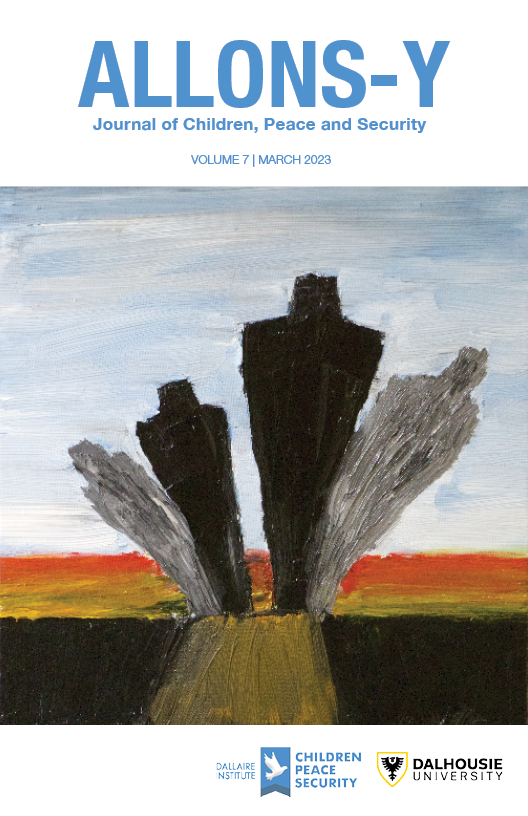Foreword
DOI:
https://doi.org/10.15273/allons-y.v7i0.11713Resumo
The increasing complexities of modern conflicts are creating new moral ambiguities, which are intensified by the increased engagement of children. The recruitment and use of children in armed conflict is unthinkable, and yet, this grave violation continues year after year. With the advancement of technology, children are being forced to perform even more roles, often glorified as service to country. As more children are exposed to the chaos of armed conflict and raised in the context of generational conflicts, violence becomes the norm and opportunities for creating lasting peace diminish. As adults we have a responsibility to prevent children from being used as weapons of war. We have a moral and ethical obligation to challenge the normalization of children engaged in violence, and to protect our future – which means placing children at the centre of conversations about conflict as well as peace.
The Vancouver Principles on Peacekeeping and the Prevention of the Recruitment and Use of Child Soldiers is a leading instrument which centres children within peace and security. Among the seventeen principles, Principle 13 – Mental Health – is focused on understanding the unique impacts of moral dilemmas involving children during deployment. Principle 13 argues for support for research, policy development, and training advancement to better prepare peacekeepers and other security actors encountering children on mission, and to improve care for those who suffer subsequent moral injury. This volume of Allons-y responds to the call for research to enhance our understanding of moral dilemmas and moral injuries during increasingly challenging times.
Severe mental trauma, much like a deep cut or a malignant tumour, can fester and spread if left to itself, until the entire system is overwhelmed and succumbs. My injury started in Rwanda, but it was exacerbated in Canada. – Waiting for First Light
Being unable to protect children in the midst of battle has a profound impact on we who serve, as well as the children themselves and their families and communities. The ethos of most armed forces is built on a notion of service, honour, and the protection of the most vulnerable. When that ethos is broken, there can be severe, even lethal, consequences. I have shared my own story of encountering children throughout the genocide in Rwanda, and our collective failure to stop the horrors. And in my book Waiting for First Light, I reveal the depth of my decades-long battle with the Operational Stress Injury sustained as a result of that mission. I explain how horrific direct encounters with children can be; but also, how the failure of institutions (civilian and military) to prepare personnel for encounters with children, and to prevent and care for the mental health consequences associated with moral dilemmas during deployments, greatly intensifies moral injury.
We use that term ‘gut-wrenching‘ to describe grief or anguish but it‘s not your stomach that‘s hurting”¦ It is deeper, in your soul. – Waiting for First Light
Over the years countless men and women have shared with me their stories of suffering the consequences of encountering children during their service. They have confided feelings of shame, anger and guilt. We describe them as the ‘walking wounded‘ – those with invisible injuries who are often sidelined professionally and left to heal alone. It is daunting to navigate a healing journey alone, especially when your injury has resulted from your service. We owe those who serve and sacrifice, so very much more.





